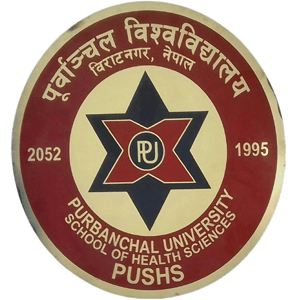Overview
Master in Public Health (MPH) at Purbanchal University College of Medical and Allied Sciences (PUCMAS), Morang (affiliated with Purbanchal University)
Eligibility Criteria:
Bachelor’s degree in Nursing, Dentistry, Medicine and Public Health as recognized by Purbanchal University with not less than CGPA 2.00 or 50% on aggregate with one year of experience after being registered with concerned councils.
Course Description:
The entry requirement for a candidate in M.P.H is determined by the specialization courses that the candidates would like to choose. Besides the basic academic requirement, a pass in entrance examination is required for all applicants to get admission into MPH program.
Despite improvement of the health status in most countries over the last few decades, many challenges are being faced to improve health status of people by the complicated emergence and resurgence of multiple health risk factors, complicated health behaviors requiring favorable changes, communicable diseases and non-communicable diseases: notably new emergence of the HIV/AIDS pandemic and environmental and climate change-threats to public health are significant challenges. Likewise social discrimination, violence conflict and irrational life-styles are the new threats of public health.
Health promotion - protection, risk factors - disease prevention and control of epidemic is the core working grounds of the discipline of public health. Tasks to be carried out under these grounds are focused primarily on people of normal to upward level of health with target of helping people to attain optimum level of health. In this context public health discipline does not mix itself with diagnosis and treatment of people/patients already exposed to or suffering from illness/disease. However, public health does not exclude encouragement of people to seek early diagnosis and treatment and refrain themselves from transferring illnesses and diseases to their other healthy fellow beings. Public health education, therefore, anchors in preparing public health professional/practitioners who work for promotion and protection of health of the people, prevention of health risk factors leading to illness/diseases and control of spread of illness or diseases during epidemics as well as in normal times. The ultimate aim of which is to help people to attain a state of complete physical, mental and social well-being. There are challenges in front of public health works many of these challenges require abundant efforts through political commitment, people participation, inter-sector coordination and priorities based resource mobilization and distribution. To response to these challenges, public health professionals/workforces should be at the forefront working together in a wide range of governmental and non-governmental sectors.
Public health is obviously viewed as one of the effective interventions for achieving national health goals of establishing healthy and productive people for national development. The development of public health workforce education, training and appropriate career structure as well as strengthening public health education and research activities is neglected and inadequate to address the new challenges of public health in Nepal. The curriculum is expected to tracks public health professionals to take leadership for assuring better health service management and improving quality of life of the people. This will be achieved through updated, specialization-focused, and contemporary community need-based curricula which can address the real needs of modern public health issues and appropriate public health management in resources constrained settings.
The Faculty of Medical and allied Sciences of Purbanchal University, Biratnagar and its affiliated institutes have been running undergraduate program of Bachelor of Public Health since 2002 with the aim to produce highly qualified graduates, who will contribute their knowledge and skills for the improvement of health of the people and to meet the challenges of public health of the 21st century by maintaining a new perspective and standard in public health education. The University through its affiliated colleges and institutes has produced thousands of bachelor level public health graduates working in various sectors in different capacities. The Faculty of Medical and Allied Sciences has but one goal – to make students able to appreciate the sanctity of life and flush them with a pioneering spirit that enables them to make a valuable contribution to the national health development. On this background, it is high time that University has to run Master’s level specialization program in public health. Such program will not only enhance the essence of university education but also boost the all-round growth and capability of the University. The master level education in public health is characterized by:
- Advanced level courses in public health
- Development of specialized public health human resources with generalist competencies
- Two years of compulsory residential courses avoiding “degree by private examination” and “degree by dissertation” systems
- Provision for general or core (50%) and specialization (50%) courses
- Opportunity for pursuing master level public health education for at least bachelor level public health, medicine, nursing and allied health and medical science graduates
- Education based on country’s public health service needs
- Reflection of national identity in public health education
- Public health education – professional expertise development & Creating opportunities or environments for exercising specialized public health professional
Contact Purbanchal University College of Medical and Allied Sciences (PUCMAS)'s administrative office for detailed information on the Master in Public Health (MPH) course, including fees, scholarships, facilities, counseling, eligibility criteria, etc.














